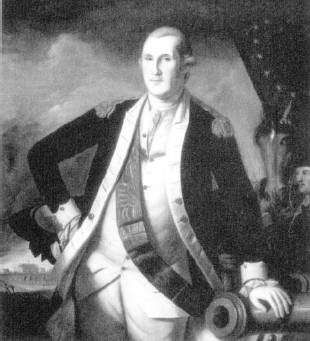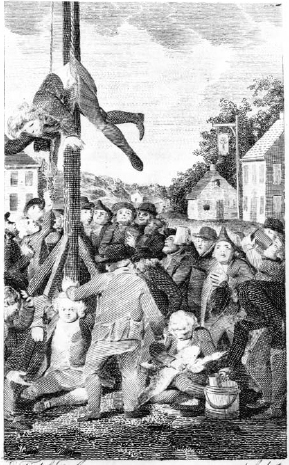American Tempest (35 page)
Authors: Harlow Giles Unger


When Adams pronounced the name George Washington, Hancock's face fell. “Mortification and resentment were expressed as forcibly as his face could exhibit them,” according to John Adams. Sam Adams, still piqued at Hancock for having seized political power in Boston, sprang up to second the Washington nominationâa move that did not “soften the President's physiognomy.”
17
Hancock was furious and broke completely with Sam Adams, whose outspoken radicalism had already alienated
northern moderates and most of the southerners. Hancock had developed increasingly warm friendships with “southerners,” who, like him, were wealthy, well-educated, cultured men who appreciated fine clothes, foods, wines, and other luxuries. Ever bitter about Hancock's wealth and good fortune, Sam Adams tried to undermine Hancock's reputation in Philadelphia, calling him, alternatively, “an oriental prince,” “King Hancock,” and a victim of “southern manners and the parade of courtly living.”
18
Adams's attacks only convinced Dickinson, John Jay of New York, and other “aristocrats” in Congress that New England was a land of “Goths and Vandals.” Hancock responded by keeping Sam Adams off committees while investing his own office with all the trappings of a sovereign nation's chief executive.
The day of the Tea Party Patriot had ended, with its indiscriminate attacks on persons and properties of Americans who espoused law, order, and moderation. The day of the American statesman had dawned. John Hancock was determined to beâand look the part ofâthe statesman.
As he had done at the House of Hancock, Hancock dressed magnificently, traveled in an “elegant chariot”âagain, Sam Adams's bitter descriptionâattended by four liveried servants mounted on richly ornamented horses, escorted by fifty horsemen, half ahead and half trailing, their swords drawn. Sam Adams muttered bitterly about Hancock's “unrepublican ostentation,”
19
but Hancock was, after all, spending his own money, and in his mind, he was honoring and personifying the office he held.
Although some New England delegates argued that a New England army required a New Englander to lead them, John Adams and other moderates convinced the delegates to vote unanimously for Washington as a figure who not only had the most military experience but whose popularity in the South would ensure participation by southern militias. Washington accepted the post, and in a grand gesture aimed at uniting disparate elements in the Congress, he refused the $500 monthly salary, declaring it his solemn obligation to serve his country without remuneration. He asked only that Congress reimburse him for his expenses.
Two days later Hancock wrote to Dr. Joseph Warren in Watertown, Massachusetts, where the Third Provincial Congress had convened. His letter
bore no trace of disappointment: “The Congress here have appointed George Washington, Esq., General and Commander-in-Chief, of the Continental Army. His commission is made out, and I shall sign it tomorrow. He is a gentleman you will all like. I submit to you the propriety of providing a suitable place for his residence and the mode of his reception . . . such as to do . . . the Commander-in-Chief great honor.”
20
As Hancock penned his inimitable signature, however, Warren already lay dead on the field of battle at Breed's Hill on the Charlestown peninsula opposite Boston. Like Boston, Charlestown sat on what was nearly an island across the bay, connected to the mainland by a narrow neck (see
map 2
,
page 82
). Two hills dominated the peninsulaâBunker's Hill, as it was then called, near the neck, and the far smaller Breed's Hill, near the water, overlooking Boston. Warren had gone to Bunker's Hill to warn the commander of ammunition shortages and then joined the troops at a makeshift fortification on Breed's Hill. He thus became the only leader of the Tea Party Patriots to jump into the trenches and fire at the enemy alongside the men he had incited to go to war.
At dawn on June 17, 1775, British warships all but surrounded the head of land and fired relentlessly on Breed's Hill. When the tide ebbed, an assault force of 2,400 landed and charged up the hill, only to be repelled by a rain of rifle-fire from the 1,600-man Patriot force. Again the British charged; again they fell back. With the third charge, however, the Patriots ran out of powder and fell back to Bunker's Hill. The British seized Breed's Hill, then quickly overran Bunker's Hill. Somehow, the madman James Otis managed to flee his brother's home with a rifle, charge up Bunker's Hill through a hail of British shot, and emerge unharmed. Patriot soldiers finally subdued him and carried him to safety. One hundred other Patriots died, however. One of them was Dr. Joseph Warren. The British wounded 267 and took 30 prisoners. But the British paid a heavy price for their victory, with more than 1,000 casualtiesâmany of them officers, whose bright red jackets made them all-too-easy targets for distant sharpshooters. Never before had Britain suffered so many casualties in a single day's battle.
On July 3, two weeks after the battle, George Washington arrived in Cambridge and took command of the Continental Army, which had grown to 14,500 men. Two days later John Hancock signed the so-called Olive Branch Petition, which John Dickinson had written reiterating the
allegiance of the American people to George III and their sincere hopes for peace. There were many merchants and planters in Congress who were more loathe than Hancock to sacrifice their fortunes to the ill-defined, ephemeral concept of “liberty.” They pleaded with the king to order an end to hostilities and initiate reconciliation. The following day, however, Hancock signed another Dickinson resolution, a “Declaration of the Causes and Necessities of Taking Up Arms.” Although it rejected independence, it reasserted the resolve of Americans to die rather than submit to enslavement by the British Parliament.
At the beginning of August, Congress adjourned for a month, and when it reconvened, a delegation from Georgia arrived to transform it into a
de facto
national government, representative of all thirteen American colonies. In early November Congress learned that King George III had refused even to receive, let alone read, Dickinson's Olive Branch Petition and proclaimed
all
the American colonies to be in rebellion. By Christmas he ordered the colonies closed to all commerce, effective March 1. By then, however, hostilities between British and American troops had broken out in both the North and South, with American troops invading Canada and capturing Montreal before suffering defeat at Quebec. Patriots in the South were more successful, defeating British troops at Norfolk, Virginia. The war against Britain turned into a civil war in the spring of 1776 when North Carolina Patriots confrontedâand crushedâa force of Loyalists at Moore's Creek Bridge near Wilmington. Farther south, a British fleet rained cannon fire on the fortifications of Sullivan's Island at the entrance to Charleston Bay. Instead of destroying the fort, however, the cannon balls embedded themselves in the soft palmetto logs of the fort's walls and strengthened themâindeed, made them all but impenetrable. When the fort's cannons returned fire, the British fleet had no choice but to sail away ingloriously, leaving the South free of British occupation.
Outside Boston, meanwhile, Henry Knox, a local bookseller whom Washington had appointed chief of artillery, had just completed an improbable three-hundred-mile journey with his men to Fort Ticonderoga, New York, and back, dragging forty-three cannons and sixteen mortars through deep snows to Cambridge. By the end of February, some two thousand American troops had captured Dorchester Heights overlooking Boston,
allowing Knox to put his artillery in positions to rake the entire city and harbor with cannon fire. By then, nearly twelve hundred Loyalistsâmen, women, and childrenâhad crowded into Boston seeking the protection of British forces. Among them were two hundred merchants, four hundred farmers, and hundreds of British civilian officials, including Chief Justice Peter Oliver.
On March 2, 1776, “the rebels, who had surrounded the town, began to bombard and cannonade it for three nights successively,” according to Oliver. General William Howe, who had replaced Thomas Gage as military commander, had no choice but to evacuate Boston or allow patriot shells to slaughter thousands of British troops and loyal civilians. On March 17, he began an evacuation by sea, and the civilians in his protection joined a stream of eighty-five thousand other Loyalists who would choose exile over disloyalty to king and country. Many Loyalists were left behind and “were obliged to take their chances of ill usage,” Oliver noted, “and some of them felt it severely.
One, in particular, was used in a strictly diabolical manner. He was a Loyalist, but an inoffensive one in his behavior. He had an amiable wife and several amiable children. The Rebel Cart, in imitation of the Inquisition Coach, called at his door in the morning and they ordered him into the cart . . . his wife begging on her knees to spare her husband and his daughters crying with entreaties. This infernal crew were deaf to the cries of distress and drove on until they had got six in the cart, whom they carried to . . . the extreme part of the town and there tipped up the cart and tumbled them into a ditch . . . forbad their entering the town again and . . . forbad the people in the country to give them food or to shelter them . . . as to save these unhappy sufferers from meeting the cruel death assigned to them by their persecutors. . . . A colonel of a
rebel
regiment was so roused with a compassionate resentment that he succored them and declared to his employers that if such inhumanity was suffered, he would resign his commission and quit their cause.
21
In a spree of sadism during the days and nights that followed, gangs of thugs broke into Loyalist homes, looting and burning, terrorizing and mistreating occupants, and, as often as not, dragging off the men to be tarred, feathered, and hung from tree limbs or makeshift scaffolds, where they suffered endless hours of physical abuse. The mob had now regained control of the Tea Party movement and tarred its good works with terror.

On March 17, the last of the British troops in Boston boarded their ships and on the following day they began destroying Castle Williamâa process that took a week, according to Oliver, who watched from the flagship.
The conflagration was the most pleasingly dreadful that I ever beheld. Sometimes it appeared like the eruption of Mount Etna; and then a deluge of fire opened to the view; that nothing could reconcile the horror to the mind, but the prevention of such a fortress falling into the hands of rebels, who had already spread such a conflagration of diabolical fury throughout America.
22
On March 26, the last of the British fleet sailed out of Boston Bay on its way to Halifax, Nova Scotia, leaving Massachusetts an independent state in the hands of the Americans and their forces. Deep sadness overwhelmed Peter Oliver as his native land faded from view:
Here I took my leave of that once happy country, where peace and plenty reigned uncontrolled, till that infernal hydra rebellion with its hundred heads had devoured its happiness, spread desolation over its fertile fields and ravaged the peaceful mansions of its inhabitants . . . [with] savage barbarities and diabolical cruelties which . . . were instigated by leaders who were desperate in their fortunes, unbounded in their ambition and malice, and infernal in their dictates. Here I drop the filial tear into the urn of my country. And here I bid adieu to that shore, which I never wish to tread again till that greatest of social blessings,
a firm established British Government
, precedes or accompanies me thither.
23